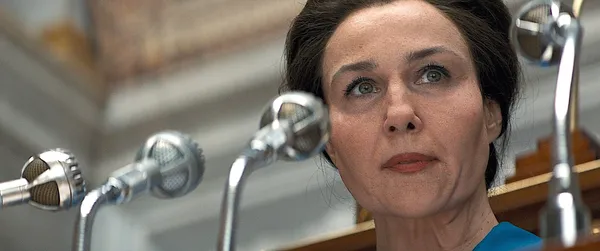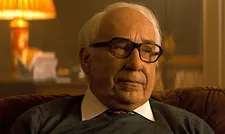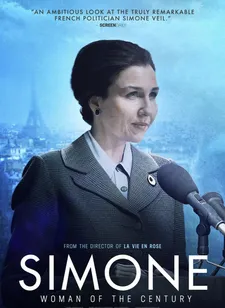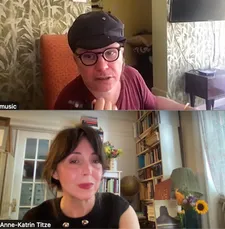 |
| Olivier Dahan: “I didn’t want to make a film about Simone Veil as we know her in France.” |
Simone: Woman Of The Century (Simone, Le Voyage Du Siècle) director, writer, editor Olivier Dahan (La Vie En Rose with Marion Cotillard as Edith Piaf and Grace de Monaco with Nicole Kidman as Grace Kelly) is no stranger to depicting influential women. His all-embracing portrait of Simone Veil stars Elsa Zylberstein (Claude Lelouch’s Un + Une, L'amour C'est Mieux Que La Vie, and his upcoming Finalement... Ou La Folie Des Sentiments) as Veil from 1968 till 2006, and Rebecca Marder (Arnaud Desplechin’s Tromperie and François Ozon’s Mon Crime) from 1942 through 1967.
In Bernard-Henri Lévy’s homage to Simone Veil he writes: “The world, French philosopher Gaston Bachelard said a century ago, could be reduced to a series of copyrights. Einstein’s relativity. Descartes’s doubt. Bergson’s laughter. Dante’s hell. Today: Simone Veil’s Europe.” Auschwitz survivor, Health Minister of France, magistrate, mother, member of the Constitutional Council, advocate for the rights of women and prison reform, and the first President of the European Parliament, Simone Veil’s importance for the 20th and 21st Century cannot be overstated.
Veil represented the danger of the truth. “People are scared of other people’s suffering,” she knew, and the fact that she felt the world wanted her to be silent about the horrors she experienced and move on weighed heavily on her.
From La Ciotat on France’s Mediterranean coast, Olivier Dahan joined me on Zoom for an in-depth conversation on Simone: Woman Of The Century.
Anne-Katrin Titze: Hi Olivier!
Olivier Dahan: Hello!
AKT: Let’s begin with memory!
OD: Yes!
AKT: Near the end of your film, Simone Veil talks about defining memory. It’s a very impressive quote. She says that for two or three generations memory and history are closely bound. These two, three generations to the Shoah are running out. Is this what you were thinking about, that this is exactly the time to tell her story?
 |
| Simone Veil (Elsa Zylberstein) at the wall of the Mémorial de la Shoah in Paris |
OD: That’s why I did the movie, actually! Because it was the end of a period and there is no way back. The whole movie is structured around this quote. Around this very ending, around thinking: what is History? What is family? What is History of the people? History with a big H. All these little differences that make a big difference. The whole movie is based on that very feeling.
AKT: I like very much that when we hear that quote, you visually go back to her happy childhood, swimming together on holiday. At the very start you have the image of a rattan table with two chairs, a lemon and purple flowers, a still life you return to at the end. I couldn’t figure out any specific connection between this and Simone Veil - unlike the white roses [connecting to an old song sung by her mother]. Please explain!
OD: There is no connection with the real Simone Veil. It’s my connection with childhood, I guess. It was completely improvised. I did a shot of the glass and the flower and when I was doing the editing, I was looking for something to start with and very quickly I started with this very simple picture. It’s almost like a painting, like a still.
And of course I wanted to end up with that because the whole movie is constructed around the childhood, memories of the childhood. All my movies are more or less based on that, actually. I didn’t want to make a film about Simone Veil as we know her in France. Even if you know nothing about this woman, I hope that you can still follow the film. That special picture that you are talking about was a sort of reminiscence of my own childhood.
 |
| Olivier Gourmet as Antoine Veil, Simone’s husband: “He’s very transformed!” |
AKT: Because you were born in the place where the Veils went on vacation, right?
OD: Let me show you! [He turns his laptop to the window] I am still in the same city! Because it’s the holidays, and I spend quite a lot of my holidays here where I was born in La Ciotat. I didn’t know that about Simone! So the first thing I did when I was eventually maybe making the film, on the first page of the first book I’ve read about her, it was saying that she was spending actually all the summers in La Ciotat. In the happy times before the war. The whole family used to spend their vacation here in La Ciotat, where I was born.
AKT: It’s all about the personal connection, isn’t it?
OD: Always!
AKT: Always! Her apartment at Place Vauban - I lived for a while in the 1990s in Paris in that same building complex, Rue Bixio, which is around the corner.
OD: Yeah, yeah!
 |
| Olivier Dahan on Rebecca Marder as the younger Simone Veil: “She was exactly the one I was looking for.” |
AKT: There is a sudden personal link. I think you go back to that sense many times in the film and in many different ways. So that even people who are not familiar with her being on TV or know her immense career can still somehow relate through details.
OD: You know I’ve been doing three different films about different real characters. Every time for me it has to be very strongly linked with my own story. Actually the film on Simone Veil is very linked with my own family on my father’s side. He was Jewish and escaped the Germans, some from this part of my family were in Auschwitz also. I didn’t want to make it as it was always done before. I wanted to make something to talk to the young people. So I took some angles to make sure it was something to connect to the young people, talking about my own experience.
AKT: I admired how you, in this respect, dealt with certain scenes, for instance the one with Serge Klarsfeld. Simone tells him who he is and it’s clearly for that new generation who may not know about his immense career. It’s extremely difficult what you were doing with this film.
OD: It’s been a long process, actually. I did my own editing. I wanted the right balance between my own feelings and also the respect for Simone Veil, the real person. At the same time I wanted to embrace the whole history of that period. Still, I really wanted to talk to young people because in my mind, there are important films like Schindler’s List, for example.
 |
| Yvonne Jacob (Élodie Bouchez), Simone’s mother |
AKT: Or László Nemes’s Son Of Saul!
OD: Son Of Saul, which is a very good film on the subject, was actually not very able to connect with the young people because it’s too much of an art film, you know.
AKT: With Geza Röhrig, I presented the opening night of Son Of Saul here in New York.
OD: Of course the film is beautiful but it’s not that easy to look at. I wanted to make something more for a bigger audience. Also remembering that the great movies on that subject, like Schindler’s List, most of the young kids never saw that film.
AKT: Right.
OD: It’s almost 30 years ago, also The Pianist by Roman Polanski is like 20 years ago. So there is a whole generation and I was really trying to connect with those young people and this woman, of course. It’s not only about the Shoah, it’s what the Shoah did to some people like her. The Shoah gave her the strength and the power to fight all her life against injustice.
AKT: There is always more information, even if you’ve read a lot and seen a lot on the subject. When she talks about the end of the war and her journey from camp to camp, the time she calls Dante’s Inferno - those scenes by you were delicately done in the film. We hear her words, her description of the horrors, but all we see is the fiery sky and then the snowy landscape from a train window. Elsa [Zylberstein] is great with the intensity of her voice.
 |
| Simone Veil (Rebecca Marder) with her husband Antoine (Mathieu Spinosi) |
OD: It’s a long single shot, with CGI of course. I didn’t want to show what she is speaking about.
AKT: The absolute horrors. Very good decision.
OD: The way she speaks about it, is so perfectly done actually. I didn’t even change a word of it. That’s the real recounting. I didn’t change anything, I just put the whole text in voice-over with the actress and that’s all. And I put it over this long shot of something more evocative, because I don’t think horror can be really shown on screen. You cannot reach that point of extreme horror.
AKT: I agree. The narration does more. Claude Lanzmann’s Four Sisters - some of the most horrific reports are transmitted by the voices of these four women, talking about their experiences.
OD: Yes.
AKT: The character of Ginette, played by Laurence Côte - these are very interesting scenes of connection and that there are no social barriers when they speak of their experiences. I noticed that the actual Ginette was thanked by you in the end credits?
OD: Yes, I had the luck to meet her. She was the only one still alive from that period, regarding the characters I have in the movie. She was very touched by the whole film. She is a very nice person. She’s been to schools a lot to talk.
 |
| Olivier Dahan on Olivier Gourmet: “He’s a really strong actor.” |
AKT: Speaking to students?
OD: Transmitting the whole of her life. It’s very strange when you speak with her, when you speak with a survivor of that period. I had the luck to have met some of them, very very old, of course. Some of them have died since. When you speak with someone who saw, who was there, and experienced the horror with the Nazis and everything. Ginette told me that she met Mengele, for example.
AKT: Oh god!
OD: Dr. Mengele was looking in her eyes. Today when I was looking in her eyes, when I was speaking and listening to her, in my mind I was thinking, oh god, those eyes have seen the real thing. It is the end of it because now they are getting very old, most of them are now dead. So at one point you will not have the luck to speak with someone who saw with their own eyes.
AKT: The eyes of Mengele!
OD: It’s almost mythical. To have met someone who has met the real Mengele or the real camp and everything. For me it was the very very last chance to speak with one of them.
AKT: There’s a moment in your film when Simone shouts after her father to not go to the census, that the census is a trap. Did she write about that? Is that accurate?
 |
| Simone Veil (Elsa Zylberstein) with her grandchildren |
OD: It’s completely accurate, that’s what she did. And she was only 14 years old.
AKT: But she had the presence of mind!
OD: Yes! This is not in the movie, but she tells the story in an interview that all that came from some years before the war. Raymond Aron, who was a great philosopher, was invited in 1935, I think it was. She was like nine-years-old and she heard him speaking at the table with her parents. He was actually just coming back from Germany at that point and he said to the father and the mother how much things were getting worse and worse in Germany. In her mind of a ten-year-old kid, she saw the whole picture. So when the French government told the Jews to register themselves, she was not good with that. Because she knew from before that something wrong was actually going on. She had a vision.
AKT: A premonition, yes. Elsa Zylberstein, whom I am also talking to, brought the project to you and then you were the one who chose Rebecca Marder to play Simone between 1942 and 1967? She has a translucence and quality of understanding. Tell me a bit about that!
OD: Oh yes! Rebecca, she was at the Comédie-Française.
AKT: Yes, I know!
 |
| Simone: Woman Of The Century poster |
OD: I didn’t know her before. I met her and she actually did some screen tests. After the very first one I knew she was the one. I did some more tests, two or three times. She was 23 at that time. She’s very very smart, very active, very intuitive. She was exactly the one I was looking for. Because I knew that she had to go into several scenes that were very difficult to do right for a young actress. It’s not easy to play that part, it’s a big responsibility regarding the real Simone.
AKT: You are showing a selection at Auschwitz!
OD: She had a great responsibility to play that. I’m very happy to have met her. She’s very sweet and very nice; it’s really someone I really like.
AKT: I’ve only been in email contact with her so far. We never met face-to-face. Arnaud Desplechin gave each of us the other’s email. I really appreciate her performance here. Another actor I want to mention, Olivier Gourmet [as Simone’s husband] - it took me I don’t know how long before I recognised him!
OD: He’s very transformed! I’ve wanted to work with him for 20 years. And we met on that one. Actually I had to change his face completely. So I didn’t really have the feeling of working with Olivier Gourmet but with the character. He’s a really strong actor. In very few scenes he reached the point I wanted to make. There’s kindness, there’s intelligence, he does everything in very small, very short scenes, but very important in the narrative. Simone and her husband were very close to each other. Simone couldn’t have done what she did without him. So it’s really a story about a couple.
AKT: His comments are poignant. One more thing about the ending, the wonderful quote on memory we started out talking about: We see her at a wall with names, which memorial is that?
OD: It’s the Mémorial de la Shoah. It’s actually the only one here, the main one. I think it’s the only one in France. Everything is there, all the archives. And the names you can read on the wall are all the deported. It is the real one in Paris where I shot. Most of the time I was rebuilding everything on set in a studio. But for that one it’s the real place.
AKT: And the sword is the one she received?
OD: The sword is the real one. The family gave it to me to make that shot.
 |
| Simone, Le Voyage Du Siècle |
AKT: The first time when I literally “heard” that you were making a film about Simone - I thought, oh the philosopher and mystic, the one spelled with a W, Simone Weil. But, no, it turned out to be Simone Veil who very much deserves to be again more widely known! Thank you for this.
OD: Thank you very much!
Read what Simone: Woman Of The Century star and producer Elsa Zylberstein had to say on Simone Veil, Olivier Dahan, Claude Lelouch, and fighting against injustice.
Simone: Woman Of The Century is in US cinemas now.






















